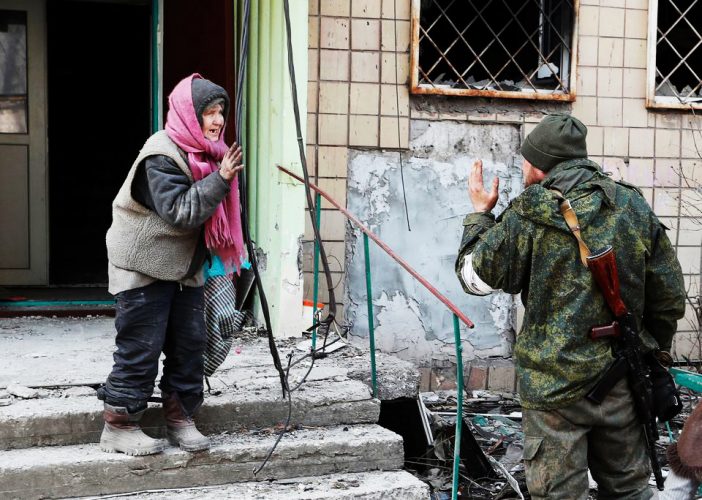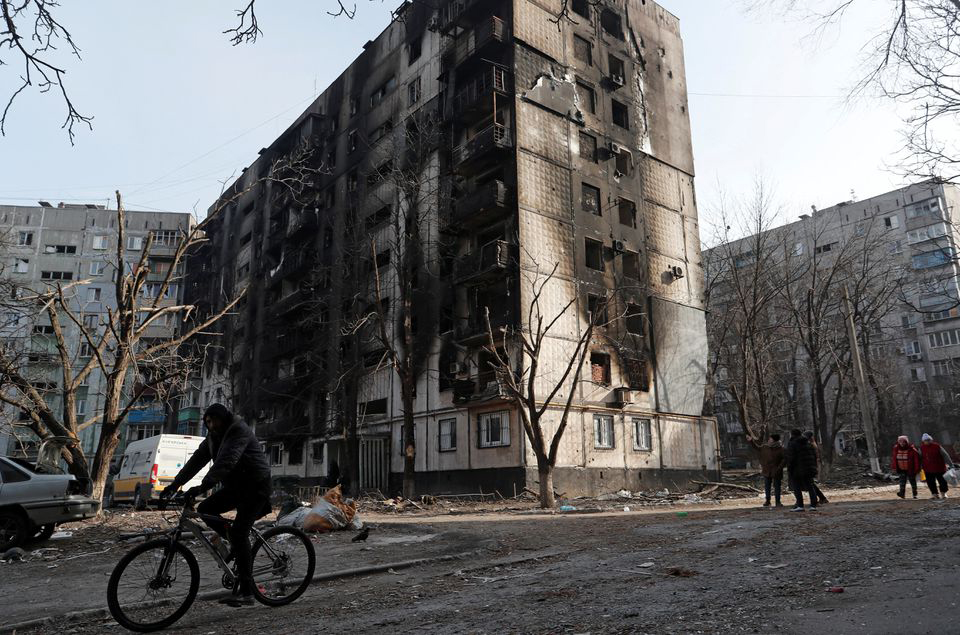TROSTYANETS/LVIV, Ukraine, (Reuters) – European buyers of Russian gas faced a deadline to start paying in roubles yesterday, while negotiations aimed at ending the five-week war were set to resume even as Ukraine braced for further attacks in the south and east.
Moscow’s invasion of its neighbour has killed thousands, sent millions fleeing and galvanised the United States and allies around the world to impose punishing penalties on Russian government entities, businesses and oligarchs.
Russia will respond to European Union sanctions, the RIA news agency quoted a senior foreign ministry official on Friday.

“The actions of the EU will not remain unanswered … the irresponsible sanctions by Brussels are already negatively affecting the daily lives of ordinary Europeans,” Nikolai Kobrinets told the news agency.
Russian President Vladimir Putin played one of his biggest cards yesterday, demanding European energy buyers start paying in roubles from today or have existing contracts halted.
European governments rejected Putin’s energy ultimatum, with the continent’s biggest reci-pient of Russian gas, Germany, calling it “blackmail”.
The energy showdown has huge ramifications for Europe as U.S. officials circle the globe to keep pressure on Putin to stop an invasion that has uprooted a quarter of Ukraine’s 44 million people.
Putin sent troops on Feb. 24 for what he calls a “special military operation” to demilitarise Ukraine. Western countries say Putin’s real aim was to topple Ukraine’s government.
At talks this week, Moscow said it would reduce offensives near the capital Kyiv and in the north as a goodwill gesture and focus on “liberating” the southeastern Donbas region.
Kyiv and its allies say Russia is instead trying to regroup after taking losses from a Ukrainian counter-offensive that has recaptured suburbs of the capital plus strategic areas in the northeast and southwest.
In a late night address, Ukrainian President Volodymyr Zelenskiy warned of “battles ahead” in Donbas and the besieged southern port city of Mariupol.
“We still need to go down a very difficult path to get everything we want,” Zelenskiy said.
Peace negotiations are set to resume by video conference on Friday. Seeking to bolster its position, Moscow is redeploying forces from Russian-backed breakaway regions in Georgia to Ukraine, Britain’s defence ministry wrote on Twitter.
The reinforcements indicated Russia had sustained unexpected losses, it said.
U.S. and European officials say Putin has been misled by generals about his military’s dire performance.
Ukrainian authorities were hoping to evacuate more residents from Mariupol after Russia agreed to open a humanitarian corridor on Friday, but several previous deals have collapsed amid mutual recriminations.
Ukrainian Deputy Prime Minister Iryna Vereshchuk said 45 buses sent to evacuate people from Mariupol had been stopped on Thursday by Russian forces outside Berdyansk, about 75 km to the west.
“Tomorrow we will continue trying to push through a humanitarian corridor to Mariupol so as not to leave our people on their own,” she said in an online post.
In a Facebook post, the general staff said Ukrainian forces were still holding Mariupol, a gateway to the Black Sea which links a strategic corridor between Donbas and the Russian-annexed Crimea peninsula.
The mayor’s office estimates 5,000 people have died.
Tens of thousands have been trapped for weeks with scant food, water and other supplies in the city that was once home to 400,000 people but has been pulverised by bombardment.
Elsewhere, there was evidence of Ukraine’s successful counter-attack in Trostyanets, an eastern town. Burned-out Russian tanks and abandoned ammunition littered muddy roads.
“We spent 30 days in the basement with small children. The children are shaking, even still,” said a woman named Larisa.
With the war exacerbating global fuel prices, President Joe Biden on Thursday launched the largest release ever from the U.S. oil reserve and challenged oil giants to drill more.
“This is a moment of consequence and peril for the world,” Biden said as he announced a release of 180 million barrels starting in May. But that amount fails to cover a U.S. loss of Russian oil, which Biden banned this month.
The war also threatens to disrupt global food supplies, with a U.S. government official sharing images of what they said was damage to grain storage facilities in Ukraine, the world’s fourth largest gain exporter last season.








